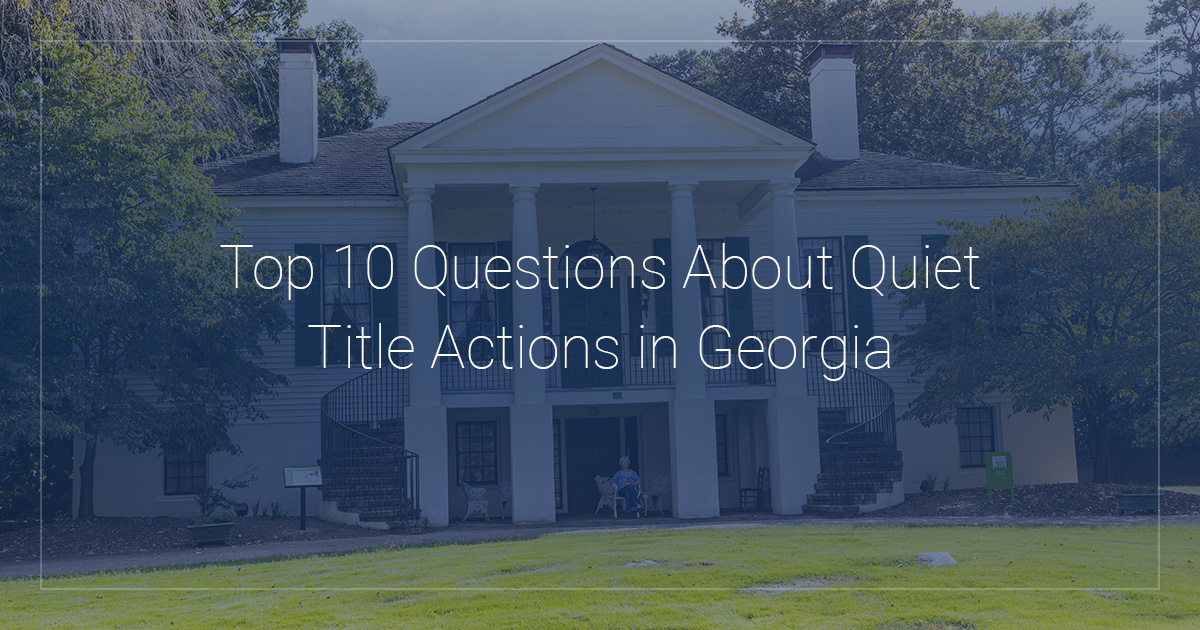A quiet title action is a legal proceeding carried out to establish a party’s title to real property against anyone and everyone, thus “quieting” any challenges or claims to the title. It is an invaluable tool in resolving disputes over a piece of land or property, eliminating any clouds on the title.
At Thrift McLemore, our Atlanta real estate attorneys guide clients through quiet title actions across Georgia. We help secure clear ownership and protect your investment.
This comprehensive guide aims to shed light on quiet title actions in Georgia, elaborating on aspects not fully covered previously.
What is a quiet title action?
In essence, a quiet title action is a lawsuit filed in a court specializing in real estate matters. The purpose of the lawsuit is to “quiet” other claims, asserting the filer’s rights and removing doubts concerning the ownership of the property. The action is crucial when the property’s ownership history is complex, fragmented, or unclear.
When do you need a quiet title action?
The need for a quiet title action generally arises when there are issues or ambiguities in the property’s title history. Such issues may include disputes arising from inheritance problems, claims by lien holders, tax sales, or inconsistencies in the property’s deed. In Georgia, a quiet title action is particularly useful in rectifying title issues due to tax deeds sales and resolving boundary line disputes.
How does a quiet title action work in Georgia?
Georgia’s quiet title law allows individuals to clear a property’s title by filing an action in the Superior Court of the county where the property is located. Once the action is filed, the court examines the title’s history and claims. It then determines who holds the rightful ownership.
The filing party (the plaintiff) must provide all the information concerning the property, including a full legal description and the potential claimants to the property’s title. The court then orders a special master (a court-appointed neutral third party) to investigate and report on these claims. Based on the special master’s report and their discretion, the court delivers its judgment.
How long does a quiet title action take in Georgia?
The duration of a quiet title action in Georgia can vary greatly depending on the complexity of the title and the number of claimants. A straightforward quiet title action can be completed within two to three months, but a more complex situation involving multiple parties or disputes may take a year or more.
Can a quiet title action remove liens?
While a quiet title action can help clear the title from other claims, it’s important to understand that it does not automatically remove liens against the property. Certain liens, such as tax liens or mortgages, may still need to be addressed separately.
Do I need an attorney for a quiet title action in Georgia?
Yes, given the complex nature of real estate laws and the importance of the quiet title action process, it’s advisable to seek the help of an experienced real estate attorney.
What is a title search, and why is it important?
A title search is a comprehensive examination of public records to determine the legal ownership of a property and whether there are any claims or liens on it. It’s a crucial step before initiating a quiet title action.
Can adverse possession apply in Georgia?
Yes, Georgia law recognizes adverse possession where a person who is not the legal owner of a property occupies it continuously for a certain period and meets other legal requirements. However, successfully claiming ownership through adverse possession is quite rare and complex.
Can a quiet title action resolve easement disputes?
Yes, a quiet title action can help resolve disputes related to easements, right of way, or other property encroachments.
What is the burden of proof in a Georgia quiet title action?
When a plaintiff challenges the legal title of a person to a property, they bear the responsibility of establishing their own title through clear and convincing evidence, as opposed to the usual standard of preponderance of evidence employed in civil cases.
Speak With an Experienced Georgia Quiet Title Attorney
If you’re facing a title dispute, call us at 678-882-0830 today to schedule a consultation with one of our Atlanta quiet title attorneys. We’ll review your situation, explain your options, and help you move forward with a clear title.







